Peter MALONE
Saturday, 18 September 2021 19:25
Rabbit-Proof Fence
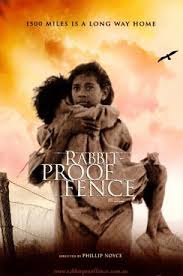
RABBIT-PROOF FENCE
Australia, 2002, 95 minutes, Colour.
Kenneth Branagh, David Gulpilil, Jason Clarke,
Deborah Mailman, Roy Billing, Garry McDonald?, Lorna Lesley, Andrew S. Gilbert.
Directed by Philip Noyce.
One of the ways of growing in understanding of Australian aborigines is to look at aboriginal stories on screen. In 2002, four films telling aboriginal stories were released. The most high profile was Phillip Noyce's Rabbit Proof Fence. Rolf De Heer made The Tracker. Paul Goldman made Australian Rules and indigenous director, Ivan Sen, won awards at the Berlin Film Festival with Beneath the Clouds.
Rabbit Proof Fence is a story of the Stolen Generation. In 1930, three young girls (two of whom, by now in their 80s, appear at the end of the film to add some heart-rending detail of how their story happened all over again with the next generation) escaped from a settlement presided over by a government official who had 'protective' rights over all aborigines in Western Australia. They returned home in a months' long trek along the fence erected to keep out rabbits.
The context of the film is that the white culture exhibited a more extraverted involvement in the management of empire. The aboriginal culture was more interior, more focussed on tradition, myths and lore. The white culture was action-oriented and governed by bureaucratic detail while the aboriginal culture was more perceptive, in some ways more live and let live, although Molly, the young leader of the three girls, was also action-oriented and quite decisive in her ways.
The world of Mr Neville, the official 'Protector', played with earnest righteousness that manifested itself in an unswerving paternalism by Kenneth Branagh, is one of clear (and unquestioned) principles. These 'objective' criteria included such policies as the lighter the skin, the more clever the child, which he alone could authoritatively determine. He quotes mathematical statistics to explain how their aboriginal blood can be 'bred out of them'. This is the logic of supremacy. Mr Neville (whom the children nickname 'Mr Devil') does appreciate that he does not understand the aboriginal mind: 'they may have neolithic tools but they do not have neolithic minds'. "The natives must be helped.' He is outwitted by Molly's combination of doggedness and ingenuity as she takes the children on their epic walk, surviving off the land, making friends along the way and good luck. Mr Neville laments, 'If only they would understand', 'My plans are in jeopardy'.
For the girls, the shock of their being abducted from their desert home, separated from their mothers and their families, highlights the more subjective world in which they live. It is a world of love and relationships that can make no sense of their being taken to the custody of the institution, let alone the minutiae of the rubrics for orderly living there. Their language is referred to by the nurses as 'That Jabber'. The only reality for them is HOME. This is the reality expressed in the voiceover comments and in the statements by the two surviving sisters at the end of the film.
All the characters live in a strongly concrete world. Mr Neville, his secretary and the home officials live in a world of rules and regulations, of forms, of budget and cost preoccupations. The externals of Mr Neville's office are neat and tidy. Everything is orderly as the criteria are scrupulously applied. Duty means responsibility.
This contrasts with the world of Molly and the girls. Their senses of seeing and hearing are acute. They are able to elude the aboriginal tracker pursuing them by moving into the water, by disguising their tracks. Their sense of traditional lore helps them to food, to follow the sun, to work out where the rabbit proof fence might be so that they can follow it home.
The apology to the Stolen Generation issue that has dogged Australian society and politics since the early 90s emerges as an echo of the differences between the protectors who knew they were doing the right thing and the people whose lives were often destroyed by the separation of children from parents and families. Rabbit Proof Fence is a proof for the Australian late-comers to the land to be (and to express) sorry.
1. The significance of a film about the Stolen Generations? At the beginning of the 21st century in Australia? Cultures around the world examining the 19th and 20th century past?
2. The Western Australian locations, the sense of the Australian vastness and the desert, the rabbit-proof fence, the range of deserts, the settlements, the towns? The centre for the children? The glimpses of Perth? The re-creation of Australia in 1931? Musical score?
3. The focus on the rabbit-proof fence, the explanations given for it, its length, significance? The importance of the girls knowing it, following it, the three different fences and their being helped to find their way home?
4. The film contrasting Aboriginal culture with its focus on the land, surviving, away from the cities, community of family and tribe? The acute use of the senses for seeing and hearing? For surviving on the land? The contrast with Australian culture, new, superior, paternal at best, protective, exploiting at worst? The aim for the breeding-out of the Aborigines in the half-caste generations? The explanation of the half-caste problem?
5. The 1930s, A.O. Neville and his role for 25 years until 1940 as Governor and Protector of all Aborigines in Western Australia? His background, his policies, the inherent racism, yet attempts at paternalism, his not understanding Aboriginal culture, his references to it as Neolithic? Yet his admiration for the girls and their being clever and shrewd? His office in Perth, his businesslike filling in of documents, concern about costs and the department, using the police, visiting the settlements, making judgments about people's education because of the colour of their skin and assumptions about their cleverness or not? His practical decisions about marriages, about pairs of shoes? His visit to the station, listening to 'Old Folks at Home'? The escape and the girl returning, his judgments about the tracker? The effect of the escape of the three girls, his wanting to keep it out of the press, his attempts to find them?
6. The postscript to the film with the story of the three women? Seeing Molly and Daisy in their eighties? Their story, their memories? The aftermath and their going back to Moore River, escaping again, marriage, Molly's daughter being taken and her never seeing her again? Their wanting to stay on the land?
7. The voice-over and Molly telling the story? Molly as a strong young girl, at the opening of the film, with her mother and grandmother and the other women, the hawk and its symbolism, chasing the goanna, native food, survival? Their being at home? Her relationship to Daisy and looking after her? Gracie, their cousin?
8. Mr Neville and his rounding up the children? His document for the taking of the three girls? The supervisor of Jigalong giving the information, warning the women that the men would come? Their arrival, the police, forcibly taking the children, putting them in the car, their looking back, the grief of the women on the ground in the dust, with the stones? The hardships of the travel to Moore River by train and by truck?
9. The children arriving, the kindliness of the nurse? Their not being used to dormitories? Their fears in the morning, the other girls helping them? Roll-call, everything neat and tidy, making the beds? The breakfast and the Aborigine demanding that they eat what was put before them? Their saying Grace - and the sweetness of the world referred to? The staff, kindly and paternal and maternal? Their having to line up, do their chores? Training for being maids? The girl who ran away and her return, in the box, her being beaten, solitary? Molly and her looking into the box? The church parade? Emptying the lavatory pail?
10. The people at the station, Mr Neville's visit and the song, the other officials and their treatment of the girls? Molly and her saying how she hated them all and visualising them?
11. The decision to go, the three girls, Gracie's reluctance? Molly's shrewdness, covering her tracks? Going into the water, along the river? Food, the adventure along their journey, such a long journey in different terrains? The chance meeting with people, getting food? Surviving by themselves? Going to the household and trying to steal the chook, the woman giving them food and clothing? Going to the household, finding Mavis, her kindness, the owner coming to the bed in the night, his reporting the girls to the police, Mavis wanting them to stay to protect her from the owner? The girls on the way again? Finding out about the different fences? The Aborigine and his telling Gracie that her mother was at the other station - and betraying her? Molly and her having to carry Daisy? The progress along the way, Gracie going by herself, their returning and finding her at the station, seeing her being taken? The continued journey, the desert, the collapse, the hawk leading them on? The women and the women's business, Maude and her standing at the fence, knowing that her children were coming? The women confronting the soldier with his rifle? Their meeting the girls and welcoming them home? Molly's final word as "Home"?
12. How well did the film draw the characters of the three girls, Molly's leadership and its effectiveness?
13. Mr Neville defeated by the girls? The range of police that he employed, the commander and his reluctance to use his men for the search, the discussion of costs? The tracker and his being forced to stay in the south with his daughter when his family was north? His shrewdness in tracking, applauding the girls for getting so far? The other members of the police?
14. The making of this film at the beginning of the 21st century, a glimpse back into Australia's past, the importance of the re-examination and re-assessment of history?
Published in Movie Reviews
Published in
Movie Reviews
Tagged under
Saturday, 18 September 2021 19:25
Rated X
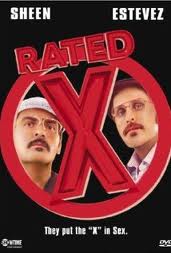
RATED X
US, 2000, 110 minutes, Colour.
Charlie Sheen, Emilio Estevez, Terry O'Quinn.
Directed by Emilio Estevez.
Rated X is the story of the pornography film directors, the Mitchell brothers, Jim and Artie. The film was made for American television, the Showtime Channel, so, in some ways it is more reticent than it might have been, had it been made for the big screen. The film can be seen in conjunction with Paul Thomas Anderson's Boogie Nights, the acclaimed look at Californian pornography film-making in the '70s and '80s.
Martin Sheen's two sons, Emilio Estevez and Charlie Sheen, have worked together before in such films as Men at Work. They work particularly well here together, under Emilio Estevez’s direction. They put more energy into their performances than their real-life counterparts might have deserved.
The film shows the young boys and their background, the domination by their father, who urged them on to a philosophy of winning at all costs. Jimmy, the older, always protected Artie. As they grew up and became involved in film production and moved into pornography, they made a number of films including Behind the Green Door, which gave pornographic films some kind of legitimacy in distribution during the 1970s. They owned their own theatre in the San Francisco area.
The film, however, shows their deterioration, their drug addiction, Artie's instability in his marriages, Jimmy always protecting his brother, even to finally shooting him and serving time for voluntary manslaughter.
The film is a quick glimpse into the world of San Francisco in the '60s to the '90s, and a sad story about wasted lives.
1. The impact of the film? Biography of pornographers? Setting them in American society of their period? A commentary and critique of their lives?
2. The San Francisco and New York settings? The re-creation of the '60s, '70s and '80s? The musical score and songs?
3. The screenplay's stance towards the Mitchell brothers, observing them as people, their rise and fall, their moral and amoral attitudes, their film-making, film distribution, clashes between themselves and fraternal rivalry, the protectiveness of the older brother, the influence of their father, the clashes with the Mafia? The court cases, Artie's final deterioration and Jim's shooting him? Commentary, approval, disapproval, critique?
4. The title and the focus on pornographic films? Their place in American society up to the '60s? The proliferation, the theatres, the audience, the changing moral attitudes? The police and arrests, court cases, defence of civil liberties and free speech? The hung juries? The exasperation of the police? The transition from small films to feature films and the Mitchell brothers becoming celebrities, Marilyn Chambers as a star? The move to live sex show clubs? The film's comment on the world of pornography, people using it, moral attitudes, proliferation in a more permissive age?
5. The two brothers when young, Artie being punished, Jimmy defending him and taking responsibility? Their father punishing Artie, his taking his two sons with the gun to threaten a debtor? His continued philosophy of life, win at all costs, even use violence? His continued approval of his sons' careers, going to the premieres, following their success? Their mother, bewildered, accepting anything that her husband and sons told her? Their father's death and its impact on the two brothers?
6. Their career, Jimmy and his student film of the protest, The Hippies? The film lecturer labelling it pornography and claiming that it was merely a device to distract, was childish? The move to buy the studio, the first films, his friends, the actors? The successes? Artie's visit and Jim inviting him to be a partner? Their work together? The buying of the cinema, refurbishing it?
7. Jim Mitchell in himself, ambitions, love for his brother, father and mother, for Adrienne? His care of his brother, the fiasco of the direction of Behind the Green Door and his taking over? The cocaine addiction, the drinking? Nervousness at premieres? Making further films, Sodom and Gomorrah? The clash with the Mafia, confronting the Mafia chief? Arrested, in court, Artie forgetting to bring the bail? The clashes between the two, friendships? Jim deciding to dry out, going to his sister-in-law's? Taking responsibility for Artie, banning him from the club, the final phone call, shooting him?
8. Artie, the spoilt younger brother, always being let off, defended by Jim? His conscientious objection to Vietnam, going to Germany, joining with Jim? Their work together, the high life, drugs and drink, women? His meeting Meredith, his marrying her, their daughter? Her exasperation and leaving him? His affairs, meeting Karen on the set, marrying her, the children? His paranoia about her tennis lessons and the coach, her leaving him? Forbidding him to see the children? His growing mental imbalance, almost drowning with the boys at the beach, Jim considering committing him? The final raging phone calls? His being shot?
9. The women, Meredith and her Cape Cod background, attracted by the brothers, marrying Artie, the family, supporting him? Finally unable to stay? Her continued support of Jim, especially in his getting clean? Karen, on the set, flirting, Artie and his dramatic proposal? The children, her final exasperation and forbidding him to see the children?
10. The lawyer, the court cases, the defence of freedom of speech? Jim seeing the lawyer finally to forbid Artie the club?
11. The actors, Marilyn Chambers coming, her audition, performance, becoming a celebrity? The auditions? The girls, the actors?
12. The father, his influence on his sons, the mother's lack of influence?
13. A satisfying glimpse of sleazy subject, sleazy characters? Perspective?
Published in Movie Reviews
Published in
Movie Reviews
Tagged under
Saturday, 18 September 2021 19:25
Ritz, The
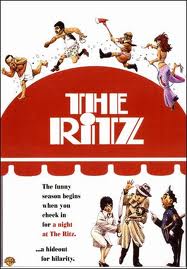
THE RITZ
UK, 1976, 91 minutes, Colour.
Jack Weston, Rita Moreno, F. Murray Abraham, Treat Williams, Jerry Stiller, Kay Ballard, George
Colouris. Directed by Richard Lester.
Director Richard Lester is noted for his fast pace and zany inventiveness. His material this time is basic farce material of mistaken identities and situation mix-ups. It has been done so often before but Lester still gets a reasonable number of laughs out of it. However, the location is not usual, the
hero threatened by gangsters and death, hides unwittingly in a New York 'gay' baths. Humour is as expected, although Jack Weston as Proclo is a highly entertaining victim of the inmates as well as his would-be assassins. However, the main comic bonus, and a really excellent one, is Rita Moreno's hilarious malapropistic performance as an off-key would-be singer.
1. How enjoyable was this film, the serious overtones, the light subject and treatment?
2. Was it evident that the film was based on a play? The nature of the dialogue and repartee, the confinement of the sets, the confined action,, the farcical situations, the short period of time? Was the play well adapted to the screen?
3. Audience enjoyment of this kind of farce? Contrived and mistaken identities, rooms, stock situations? The nature of the humour and its appeal, the necessity of pace and timing? Success in this regard?
4. The humour and wit of the dialogue? The deadpan nature of the dialogue? The humour out of identities?
5. The Mafia background and the satire, the old nun's death, the Mafia kind of vengeance, the desperate nature of the pursuit, the threat to Proclo? The skittish nature of the death and the setting of scene?
6. The atmosphere of the gay baths? The name of The Ritz, the seediness of the place and its look, Abe and his deafness at the entry, the irony of the camp decor of the place, the variety of the rooms and the parody, the parody of the types of inmates the play on 'gay' situations and characters the ambiguity of the jokes? Well done, in good taste?
7. How well did the film use the gay situation merely for jokes any insight humanity?
8. The satire on detectives via Brick? His appearance, his voice, his presence in the gay baths,, his stupidity, his mistaken identities and saving the person he was sent to kill? The happy romantic ending for him? What conventions of the American detective were parodied?
9. Comment on the inmates of the gay baths. The types presented, Chris, Claude and the background with Proclo and his obsession with fat men? The humour of this and its giving rise to so many situations? The conventional characters in the baths?
10. How well drawn was the character of Proclo? Seeing things through his eyes? His predicament, his trying to stay alive, being pursued by Claude, Brick, the arrival of Vivian, the humour about Google and her theatrical career?
11. The satire on Vivian and Vespucci? Vivian's disguise as a nun and being pursued by Claude etc.? Vespucci having to escape like a woman? The satire in the reversal of male-female roles? The irony that The Ritz was owned by Vespucci?
12. How important was the character of Googie, her humour? The fact that she was mistaken for a transvestite? The badness and humour of her songs? The malapropisms in her dialogue? A more developed character and her role with Proclo, with Brick? Her ambition?
13. How well did the film handle the ambiguities of homosexuality and heterosexuality. in the light vein?
14. The importance for impact of the various set pieces: the farcical situations, the ambiguous violence, the songs, the parody of the Andrew Sisters, the parody in the ending?
15. The final barb in the satire about the ownership?
16. Did the film make sufficient of its basic material?
Published in Movie Reviews
Published in
Movie Reviews
Tagged under
Saturday, 18 September 2021 19:25
Random Encounter
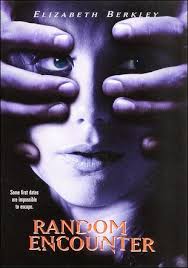
RANDOM ENCOUNTER
US, 1997, 100 minutes, Colour.
Elizabeth Berkeley, Joel Wyner, Barry Flatman.
Directed by Doug Jackson.
Random Encounter is the kind of thriller that can be seen any night of the week on television. However, it is very well made and keeps the attention. It focuses on a career woman, played unexpectedly by Elizabeth Berkeley (whose inauspicious film debut was in Paul Verhoeven's critically mauled Showgirls). However, even if one has to suspend disbelief about her ability to be such an executive at 28, she handles the role attractively and engages audience sympathy. Joel Wyner seems an unlikely business executive until he is unmasked and is perfectly convincing as the criminal on the make.
The film is set in the world of big business and takeovers and shows manoeuvres in the boardrooms. However, it is also the story of a casual one-night stand which turns into a nightmare, Elizabeth Berkeley being set up so that her career would be destroyed. While the shootout is a quick fix-it ending, the film nevertheless retains the interest.
1. Entertaining business, romance, detective murder thriller? An
entertaining combination?
2. The Chicago settings, the business world, the affluent homes, the offices? The contrast between the world of Ally and the world of Kyle?
3. The title, the focus on the evening, the consequences for Ally and Kyle?
4. The picture of Ally: competent in her work, being groomed to take over, the opening sequence of the Japanese tourist being murdered and her handling of the situation? The party and her organisation of it? Her relationship with her parents, her dying father, her loving mother? The party, her secretary urging her on, going with Kyle? At the home, the encounter, Madeleine's arrival, the fight, Ally killing her? The dilemma and the decisions, Kyle's persuasiveness? Hiding the body, arranging the accident? Getting the petrol and her being seen? Her nightmares? The detective and his continued questioning? Her learning more about Kyle, the visits, the phone calls? The following him, his apartment, finding out the truth about him? His going to her birthday party at her parents'? The final confrontation in her house, the demand for money, the detective following her, giving over the bag, the shootout, and her killing him with the ornament? Poetic justice?
5. Kyle, his appearance at the party, focusing on Ally, the seductive
manner, the credibility of her falling for him (the busy businesswoman who succumbs to the first available man?)? His treatment of her, the romance, the death, his anxiety, the cover-up, the accident? At the hotel, the phone calls, his going to her home? Her suspicions of him, following him, in his apartment? The truth about him, his cards, the parole officer and the phone call? His confrontation, the truth about his relationship with Madeleine, going to Ally's parents' place, the demand for money, the meeting at the train? The final confrontation and his death?
6. The detective, tenacious, the interrogations, suspicions, visits with Ally, her anger with him? His shrewdness in following her, the final confrontation?
7. Blake, being retired at 52, the owner, the deals? His grooming Ally for the job? The meetings, catching her off-guard? Her discovery of the truth, the e-mails, his relationship with Madeleine, his speech and resentment about having to retire? His not wanting anybody dead?
8. The world of big business, the executives, the owners, takeovers, board meetings? Tactics to save careers and reputations in the business world?
9. The supporting characters, especially Ally's parents, her mother and the meal with her, solicitous, her father and his illness, the fishing flies as a gift? The birthday? Her secretary, support, the birthday cake? The finale with Ally going fishing with her father and learning that there was more in life than business?
Published in Movie Reviews
Published in
Movie Reviews
Tagged under
Saturday, 18 September 2021 19:25
Royal Tennenbaums, The
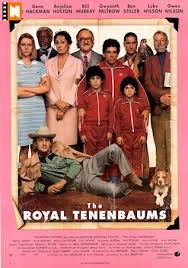
THE ROYAL TENNENBAUMS
US, 2001, 110 minutes, Colour.
Gene Hackman, Anjelica Huston, Ben Stiller, Gwyneth Paltrow, Luke Wilson, Owen Wilson, Bill Murray, Danny Glover, Kumar Pallana. Narrated by Alec Baldwin.
Directed by Wes Anderson.
The Royal Tennenbaums is a tour-de-force satire written and directed by Owen Wilson, one of the stars, and the director, Wes Anderson. Wilson and Anderson had already combined for Bottle Rocket as well as Rushmore, both films being critical successes. Anderson was to go on to direct The Aquatic Principle.
The film portrays the American dysfunctional family par excellence. Gene Hackman won a Golden Globe for his performance as Royal Tennenbaum, the patriarch of this family, generally absent but, as he is about to die of cancer, coming back into their lives. Anjelica Huston is the matriarch who has made good a life for her family without her husband. The dysfunctional children include Ben Stiller who has never grown up, Gwyneth Paltrow, a novelist who has writer's block and isolates herself, and Luke Wilson, a young tennis star who has never made good. Other stars in the cast include Owen Wilson as a neighbour as well as Bill Murray and Danny Glover.
The characters are caricatures but, because of the skills of the stars, they become characters and quite rounded as well. The film creates very funny sequences of the children in their heyday and their success and then makes the contrast between the influence of parents and the fact that the children have stopped growing.
The Royal Tennenbaums is probably an acquired taste but, for those who find it amusing, it will keep a smile on the face continually and also produces some good hearty laughs.
1. Entertaining piece of Americana? Perspectives on American families? Functional and dysfunctional? American dreams, ambitions, the shattering of the American Dream?
2. The structure of the film: the introduction to the characters, the books, the covers, the prologue, chapters and epilogue? The device for abbreviating incidents? The device of the voice-over, the tone, factual, sardonic?
3. The New York settings, the home, the streets? An atmosphere of New York City? The hotels? The range of the musical score, classic and modern? The final song?
4. The title and its tone? Americans and royalty? The overtones of the name Tennenbaum? The combination? Royal Tennenbaum and his middle name being O'Reilly?
5. The description of the family: the American Dream, mother, father and three children? The children as geniuses? The leaving of the father, abandonment, the mother having to raise the children on her own? Their attitude towards their father, dependence on their mother? The shattering of their genius once the father had gone?
6. Gene Hackman as Royal Tennenbaum, comic touches? The descriptions from the voice-over? Age and experience, loving Etheline, three children? His attitude towards his children, not fully aware of them, even their names? His sharing their experience - and distancing himself? His disappearance for over twenty years? His own life, being sued by Chas, behind bars, living in the hotel? His friendship with Dusty and reliance on him? The attitude of the people in the hotel? His persuading Rick to allow him to come home, the fait accompli for the family? His reaction to Etheline marrying again? The charade of his illness, explanations to Etheline, her compassion? In the room, the equipment, Dusty as doctor and his solemn comments? His eating fast foods and so on, on the sly? The confrontation with each of his children? Margo and her depression, her infatuation with Rick? Her marriage to Raleigh? Chas and his continued resentment and their confrontations? His always being fond of Rick, taking him out when he was small, disgusted at his tennis collapse, trying to build him up again? His friendship with Chas's children, taking them on all kinds of activities - shoplifting, riding on garbage trucks etc? A child at heart? The build-up to the wedding, the car crash, the postponement of the wedding? His reconciliation with everyone? Going on the garbage trucks - even with Chas? His death, Chas witnessing it, the gravestone and the piece about the sinking ship? The portrait of an eccentric American?
7. Etheline, the quiet dependable type, her love for Royal, bringing up the children? Being calm in the midst of crises, helping them along - but not quite aware of what was happening? Her friendship with Henry, his proposal, the plan for the marriage? Royal coming back, her compassion? The accident, the finale with the wedding - and happy ever after for her?
8. Chas, child genius, the mice, finance and his own company? Standing for breakfasts, so busy? Growing up, the death of his wife in the plane crash and his depression? His love for his two children? His work, dislike of his father, exasperation with the family? His father's illness, the fights, Royal and his going out with the children? The graveside scene? The eventual reconciliation, the new dog, the happy ending - even on the garbage truck with the boys?
9. The boys, their appearance, names, the dog? Always busy, serious? The transformation with their grandfather and their escapades? The new dog and the happy ending?
10. Margo the child genius, her plays, publications, marrying Raleigh, falling out of love with him? Continued depression, concealing her smoking? Her infatuation with Rick? The discussions about her state of mind, her explanation of her depression? The wedding, separation from Raleigh, with Rick? The final performance of her play - and her father the only one laughing?
11. Rick, fond of his father, the pet, the outings, his tennis achievement, the collapse? His infatuation with Margo, the adopted sister, his collapse on the courts? Morose, not achieving anything, shaving and cutting his hair? A transformation, his relationship with everyone, pleased that his father was back, conning his mother into taking Royal in, setting him up with all the equipment? The gradual reconciliation with Margo?
12. Raleigh St Clair and his marriage to Margo, not in love? His being morose? His work with Dudley, the interviews and the tests, the parody of psychological testing? His going on tour, the press conferences with Dudley? Dudley as a character, disabilities, their being exploited, his friendship with Raleigh, the book and the tour?
13. Henry as the solemn accountant, his son, the friendship with Etheline, falling in love, proposing? His reaction to Royal, seeing through him? Resisting the upsets? The build-up to the wedding, the accident, the finale?
14. Pagoda, his place in the family the story of his stabbing Royal in Calcutta and rescuing him? Spying for Royal, phoning him, helping him with his deceits? His place in the family?
15. Dusty, the hotel, stepping in as the doctor, the family friend?
16. The hotel, the ultimatums to Royal, his paying them, their having to cope with him?
17. American humour, offbeat, seeing the family at a different angle, affirmation, critique, the comedy of eccentricity?
Published in Movie Reviews
Published in
Movie Reviews
Tagged under
Saturday, 18 September 2021 19:25
Rush Hour
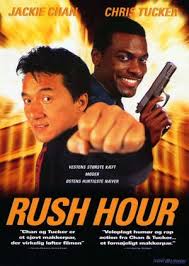
RUSH HOUR
US, 1998, 97 minutes, Colour.
Jackie Chan, Chris Tucker, Tom Wilkinson, Philip Baker Hall, Chris Penn, Elizabeth Pena.
Directed by Brett Ratner.
Rush Hour hit the spot at the box office. Set at the eve of the British hand-over of Hong Kong, it spends a considerable amount of time in Hong Kong before transferring to the United States, having the best of both worlds.
It is a strong Jackie Chan vehicle and he is obviously enjoying himself very much. The film is in the vein of Crocodile Dundee with the person from another culture and another hemisphere trying to discover how the United States ticks. His American counterpart is played by Chris Tucker (often irritating in his screen manner as in The Fifth Element). The villain is Tom Wilkinson.
The film provides opportunity for Jackie Chan to continue to dazzle audiences with his stunts. In fact it was so popular that a sequel came out some years later. Direction is by Brett Ratner, a director of a diverse range of films including The Family Man and the third of the Hannibal Lector films, Red Dragon.
1. Jackie Chan and his popularity over the decades? In Hong Kong cinema? In the US and overseas cinema? His character, screen presence, comedy, action, stunts?
2. Jackie Chan in Los Angeles? The contrast between the Hong Kong settings and LA? Buildings, streets, art galleries, police precincts, restaurants? Jackie Chan and his stunts? Special effects? The musical score?
3. The title and its tone, the urban setting?
4. Jackie Chan in the US, his presence, Chinese language, questions about food, music, seen as an alien? Establishing himself as a presence? His work as a policeman, his friendship with Han? His dedication to retrieving Han's daughter?
5. Chris Tucker as Carter, screen presence, stand-up comedy, voice and mannerisms? His unorthodox methods, attitude of the police chiefs, the FBI? Assigned to the case? The encounter with Lee, their clash? The irony of the mock-racist remarks? The beginning of friendship?
6. The handing over of Hong Kong to China, the consul, the ex-British officer? The party, the thefts and the art galleries? The kidnapping of the young girl? The plan, the money demands, the phone calls, the rendezvous, things going wrong?
7. Lee as pleasant, as Carter's sidekick, avoiding him, going to the restaurants, finding out information? Who was in command? Loyalties, initiatives? Learning from Carter? Their discussion about their fathers? Saving each other?
8. Carter and his style, suspicions of Lee? Exasperation? His living up to his father? The FBI and the LAPD? The attitude of the authorities? The case, the connections and bluff? Phone calls, set-ups? The use of martial arts? Saving Lee?
9. Tom Wilkinson as the villain, henchman, his alias, the artworks? In Hong Kong, in the United States, the restaurants? The confrontation, the chase and his spectacular fall to his death?
10. The conventional action set-ups, stunts, comedy? An opportunity for action, comedy, police work, issues of right and wrong - and Jackie Chan?
Published in Movie Reviews
Published in
Movie Reviews
Tagged under
Saturday, 18 September 2021 19:25
Romper Stomper
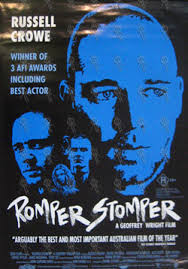
ROMPER STOMPER
Australia, 1992, 94 minutes, Colour.
Russell Crowe, Jacqueline Mc Kenzie, Daniel Pollack.
Directed by Geoffrey Wright.
Romper Stomper was the first feature film from Geoffrey Wright who directed the short drama, Lover Boy. He then went on to make Metal Skin.
There was a great deal of controversy when the film was released. It portrayed aspects of racism which were to emerge in Australian society later in the 1990s. Set in Melbourne's Footscray, the film has an early sequence where skinhead gangs pursue Vietnamese teenagers through the streets and yards of the suburb (with tour-de-force hand-held camera).
However, the film moves away from the Vietnamese themes to looking at the bonding within the neo-Nazi group and the power exercised by its lead, Hando, showing how, when friendship and humane elements enter in, the group collapses.
The film has been influenced by Kubrick's A Clockwork Orange, especially in subway sequences and the robbery at the affluent house.
Russell Crowe won the AFI award for Best Actor and the film was nominated in the major categories in 1992.
1. Impact of the film? Australian controversies? International controversies - and overseas images of Australia?
2. The title and its sound and tone, violent games, kids, childishness, victims?
3. The location and colour photography, Footscray, the railway station, the streets, pubs, houses, warehouses, the contrast with the homes of the rich, suburban homes in Northcote, the road, the beach? Day and night? The colour tones of the film, blues and dark shades? The tones and moods? The atmosphere of the musical score, the songs, the lyrics and their meaning?
4. How realistic a film? How naturalistic? Exaggerated? The focus on Australian skinheads, Melbourne, the western suburbs of Melbourne? Capturing this in the film's style, action sequences, hand-held camera in fights and chases, the pace of the editing, modern and rock video styles? The texture of the film?
5. The opening, the sound, the music, the tunnel - and the visual echoes of A Clockwork Orange and the Droogs? The Clockwork Oranges of Melbourne? The confrontation with the Vietnamese, the fighting, the initial presentation of characters, their violence and racism?
6. The picture of the Vietnamese, their response, victims of racism, the physical pain in the attack, going to the restaurant, seeing their work, livelihood, life and community, language? The subtitles? The desire for revenge? Their generally quiet response, the violent response? The picture of the suburbs, life at the hotel, the selling of the hotel (and the racist issues)? Looking over the hotel, the skinheads coming in, the attack, their allies, the battle? The violent chase and fight as the centrepiece? Violence in itself, youth, social conditions for such violence, unemployment, race relationships? Hando's explanations? White Australia (and his derogatory comment on the aborigines and their being subjugated by the whites)? The need for white supremacy?
7. The picture of the gang, its fascist lifestyle and codes, images of Hitler and Nazism, swastikas? Hando and his being influenced by Hitler, reading Mein Kampf? A reader, a thinker - as typical of many right-wing youth of the '90s, intelligent, their reacting against migration, loss of jobs? Expressing the right-wing views of many Australian groups? Rebellion, the dole? The warehouse and the rooms, decor? Clothes, skinheads, style? Articulate and inarticulate? The young men and women who were following on? Hando and his hold on the gang, friends? The visitors from interstate? The commune in the warehouse together? The macho attitude of the men towards the women? The submissive attitude of the groupies?
8. The fight with the Vietnamese, the gang and the defeat, running away, the angers, the girls leaving? Stealing and the mess? Betrayal? Gabe and her coming into the group, the effect on all of them, loyalties, love friendship? Gabe breaking up the ethos of the gang and its codes, her betrayal? The police, the arrests, the deaths, the collapse of the gang?
9. Russell Crowe as Hando, screen presence, in himself, as a leader, his intelligence, his right-wing bigotry, racism, capacity for violence? His friendship with Davy? With the other men, with the women? In the bar, in the fight, his leadership, at the warehouse, his treatment of the visitors from Canberra? The encounter with Gabe, the coat, smashing the window? The sexual attraction, the dancing, the sexual encounters, the morning after? Sailor? The fight as a turning point in his life? Gabe's coming as a turning point? The Hitler loyalty, his fascist attitudes in the hotel, his brutality but the change when beaten? Ousting the Vietnamese, the talk about Wog food, the growing tensions? The decision to rob the house, the failure? His relationship with Gabe, discarding her? His reaction to the relationship between Gabe and Davy? His finally being hounded by the police, alone? The irony of the deaths, Davy going to Northcote? The escape, the killing, the beach fight and the pathos of his death - and the Japanese tourists photographing it?
10. Davy and his background, the explanation of his father, his visit to his grandmother, his brutality, loyalty to Hando, friendship? His personal sensitivity, the reaction to Gabe? The coat, washing up? Leaving, going home, his grandmother, the ride? Death?
11. The contrast with the world of Gabe, her wandering the streets, the encounter with Hando, the coat, the smashed window, going to the warehouse, her seductive attitude towards him? Her turning to Motherly, the washing up and Hando's reaction? Her relationship with Martin, the toughness, his rescuing her? The drugs? The background of the incest theme, Martin's violence towards his daughter? The robbery of the house and her betraying her father? The bar, Hando, sex, talk, hanging on, fighting, fear, the growing harshness, cooking and washing, the final decision to betray after her relationship with Davy, the end and overhearing?
12. The men in the gang, their characters, their appearance and clothes, indistinguishable from the other? Their submissiveness in being led? Their being manipulated and allowing themselves to be manipulated? The group from the ACT and their ethos? The contrast with the girls in the gang, their appearance, hairstyles, clothes, behaviour, submissive, the typical `molls'? Their being ousted and going?
13. The picture of the police - objective or not? The robberies, the violence, police anger, the siege of the warehouse? The pursuit of Hando?
14. The picture of the ordinary people of the western suburbs, the hotel owner and wanting to sell? The Asians moving in and their way of life?
15. Martin, his relationship with his daughter, brutality, saving her, paying her debts, rescuing her? His control over her? Her reaction, the robbery of the house and his experiencing the violence?
16. The gang ethos? '90s fascism in Australia, a just mirror - a necessary mirror? The irony of the ending, Hando and his being defeated, with the irony of the tourists taking the photos?
Published in Movie Reviews
Published in
Movie Reviews
Tagged under
Saturday, 18 September 2021 19:25
Rio Bravo
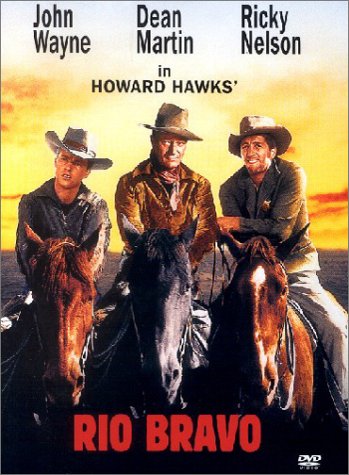
RIO BRAVO
US, 1959, 141 minutes, Colour.
John Wayne, Dean Martin, Ricky Nelson, Walter Brennan, Ward Bond, Angie Dickinson.
Directed by Howard Hawks.
Rio Bravo was not hailed as a classic western on its release in the late 50s. It was just another John Wayne western. However, the reputation of Howard Hawks has grown over the years - his Red River, also with Wayne, is now another classic.
Wayne is the personification of the western lawman. He is well supported by Dean Martin at the beginning of his solo career and by Angie Dickenson. The film was virtually remade by Hawks as El Dorado in 1966 and was the basis, it is said, for John Carpenter's Assault on Precinct 13 (1977). The film was written by Hollywood veterans Leigh Brackett and Jules Furthman.
1. This is considered by critics a classic western. Do you see why?
2. What principal conventions of the western did the film use? How well did it use them? Did it create western myths? Or did it just merely tell a story and leave it at that?
3. The scope of the western seemed to be rather big, yet the context of characters and incidents was small. How did the film, by using such a small story with few characters, achieve such greatness and depth?
4. How important was the opening of the film? The character of Dude and his weakness? The money in the spittoon and the human contempt? Chance's intervention? Dude's ingratitude? At the initial murder? How did this create atmosphere and establish the characters in relation to the atmosphere? In relation to the town?
5. How important was the theme of the help or lack of help for the sheriff? In westerns this is a typical invention. Generally, the sheriff had no help here except an alcoholic and a cripple. When he did get help, the help was killed. What did this indicate about heroes, isolation, collaboration from the townspeople?
6. How heroic a figure was John Chance? A typical John Wayne figure? What were his strengths? His weaknesses? His sense of justice for the town? His relationships with Dude, Stumpy, Feathers, Colorado, the murderer Joe? Did he relate well? Or did he seem to be somewhat outside the human circle? How did the incidents in the film change him? Was he a more real person by the end of the film than he was in the beginning? Why?
7. How important was the character of Dude? Howard Hawks considered that he was the central character. Do you agree with this? Why? What strengths did the character of Dude have? What were his weaknesses? Was his drinking and despair well enough explained? Why did he have such a low opinion of the himself? Why did he rise to this occasion to help Chance? How well did he cope? Why was he put off by Stumpy's accidental shooting at him? How nervous? Did Chance help him to get some self-esteem? Did his work help him with self-esteem? In response to the taunts? His discovery of the murderer upstairs? His handling of the situation? His despair at the end that he was tricked? How did he redeem himself? Was this development of character interesting throughout the film?
8. The role of Feathers in the film. Her accidental presence in the town? Her strength? Her challenging of John Chance? Her over-talking and yet her wisdom? Her sexiness? The effect on John Chance? Her being confronted by a difficult situation and her response to it? Her helping Colorado to save Chance? (This in contrast to her reputation on the handbill and her explanation of it.) What did she contribute to the end of the film? How did she change John Chance and help him to relate?
9. The intervention of Pat Flannery. The only character who volunteered to help? His being gunned down? What comment did this make on the town and its justice?
10. Colorado: was he a convincing character? Was he too much of a romantic hero? Why did he initially refuse to help? Why did he change his mind? Was he a help? Did he help in the situation of the characters and of the town?
11. Did you enjoy the character of Stumpy? Was he humorous or was his humour overdone? The fact that he was a cripple yet he helped Chance? His ability in doing his job? The fact that he could outwit those who were trying to outwit him? His final contribution to Dude's change and John Chance's change?
12. How did the film explain Joe and his callous attitudes? The fact that he could murder? The hold that the Burdette family had over the town? Latham Burdette and his arrogance? (Was he really interested in Joe at all except for pride?) His hiring of killers and their shooting people down?
13. The contribution of Carols and his wife to the film? Humour? Related to the theme of the development of the plot? Carols' intervention at the end?
14. Did Dude have a sufficient number of choices at the end? What prompted him to keep going as the deputy? The challenge when Colorado was deputy? Why did Dude become good?
15. How was the film and its relationships between the people summed up in the singing sequence? Was it merely an excuse for Dean Martin and Ricky Nelson to sing? How much good humour was there in it? The camera moving to each of the singers? Stumpy's intervening to sing? John Chance's smiling and yet his not standing within the circle of the singers?
16. How dramatic was the final resolution of the problem? The use of wits? Stumpy's contributing to the dynamiting? And the fact that the Burdettes came out instead of being shot?
17. How well did the film resolve itself as a western?
18. What view of humanity did the film take? How sympathetic a film? An optimistic western? Is this the kind of film that was reacted against in the '70s? With the anti-westerns? How was this a classic western?
Published in Movie Reviews
Published in
Movie Reviews
Tagged under
Saturday, 18 September 2021 19:25
Reformer and the Redhead, The
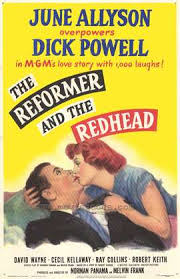
THE REFORMER AND THE REDHEAD
US, 1950, 90 minutes, Black and White.
Dick Powell, June Allyson, Cecil Kellaway, David Wayne, Ray Collins, Robert Keith, Marvin Kaplan.
Directed by Norman Panama and Melvin Frank.
The Reformer and the Redhead is a pleasant social comedy of 1950. It has echoes of the films of Frank Capra with their optimism about individual heroes and their exposing of wealthy corruption. It is a star vehicle for husband and wife team Dick Powell and June Allyson. June Allyson is, as usual, a fiery heroine, Dick Powell the sympathetic orphan who wants to become mayor and compromises with the powers that be. Ray Collins is the corrupt commodore with Kathleen Freeman giving an amusing turn as his niece. David Wayne is the adviser - playing in much the same way as he did in Adam's Rib. The supporting cast includes Cecil Kellaway and Robert Keith.
There is a lot of comedy involving animals, especially lions. There are enthusiastic rallies of orphans to help in the election campaign. There is also romantic comedy and emphasis on honesty and integrity in public life. The film was written, produced and directed by the team of Melvin Frank and Norman Panama, directors of many comedies over several decades.
1. Entertaining comedy, romance, political themes?
2. MGM production, the strong cast, the stars? Musical score?
3. The title and expectations? Focus on the central characters?
4. The introduction to the commodore, his big-game hunting, the fraud? Lily accompanying him? Their return to the town, their position in society? The land and the cover-ups? His cronies in politics? Looking for the mayoral candidate? The meetings, the decision to support Andrew, their hold over him? Public appearances? Comeuppance? Lily and her fight with Kathy?
5. Kathy and her father, his work in the zoo, love of animals? His dismissal? His care for the lions? His love for his daughter, concern about Andrew? Kathy and her fight with Lily? Going to Andrew's office, the encounter with Arthur and Leon? Andrew and his interest in the case, her talking bluntly to him, taking him home, the incident with the lion, helping with the giving birth? Staying to dinner? Changing his attitude? Going to Sacramento and finding the documents against the commodore? Moving from his support? The political compromise? Kathy in love with Andrew? Her disappointment? Giving him the letter from her dead mother? Her listening to his speech? His change of heart, in pursuit of him? The comedy with the lions?
6. Andrew, his background, reform candidate? Arthur and his advice? The encounter with Kathy, changing him? Going to Sacramento? Compromising with the commodore? The importance of their campaign, Kathy and her ideas, the orphans, the rallies, the various national groups? Reading the letter? Kathy's visit? On the street in his pyjamas? His change of heart, his speech? The final comedy with the lion?
7. Arthur and his advice, cynicism, helping Kathy, friendship, support? Leon and his wanting a raise, getting drunk, telling Tim the truth?
8. Tim, his friendship, the law? Discovery of the truth, telling Kathy? His getting Leon to tell him what had happened?
9. The popularity of this kind of movie? Romance and comedy? Town politics? Corruption - and exposure and the prevailing of integrity? The various ways this was done over the decades?
Published in Movie Reviews
Published in
Movie Reviews
Tagged under
Saturday, 18 September 2021 19:25
Red Rock West
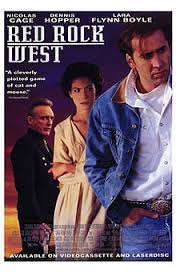
RED ROCK WEST
US, 1993, 98 minutes, Colour,.
Nicolas Cage, Dennis Hopper, Lara Flynn Boyle, Dwight Yoakim, J.T.Walsh.
Directed by John Dahl.
Red Rock West is an excellent film noir of the '90s. It was written and directed by John Dahl, whose previous film was Kill Me Again, with Val Kilmer and Joanna Whalley Kilmer, a '90s variation on Double Indemnity. The present film is parallel in its plot, characterisations, twists with commitment and betrayal. This time the hero is Nicholas Cage, an honest ex-marine, in a part which suits his personality. Dennis Hopper is very good once again as a maniacal assassin. J.T. Walsh and Lara Flynn Boyle are the couple who want their spouses killed - and more revelations about their evil are made during the plot.
The setting is Wyoming, the small town of Red Rock. The script is neat, playing on the conventions of the genre, utilising coincidences particularly well. It is a bad day at Red Rock.
1. Impact of the thriller, a '90s film noir, the '40s and the black and white thrillers of heroes, betrayal? The impact of the past films and their tradition, in the present? A particularly American style of thriller?
2. The Wyoming landscapes, the drilling sites, the desert, the small town, interiors, the road? The familiar landscapes - but with unfamiliarity?
3. The title, the focus on the town and its people, its size, the events, the morality, law and order? The highway west? The songs and the musical score?
4. The structure of the film and Michael waking up, getting dressed, facing the day, his experience, his perspective? Two days in his life? The characters he met, the range of coincidences, his being trapped? The intersection of the characters? Realism and plausibility? Conventions? Audience expectations and suspense?
5. Michael as a character, alone, dressing, driving, the job, his friend, the interview, filling the form, his honesty and telling the truth, his marine injury, losing the job, out of petrol, the temptation to steal the money, his not robbing the gas station, getting advice from the owner? Strong character, moral stances - a hero?
6. The background of his story - as he told it to Lyle? Lebanon, the deaths and the injuries, the effect on his life, integrity, not getting any help? His wanting to save people? The one lie - joke, weakness? The consequences? The growing violence and his handling it, the lies, murder? His trying to save people's lives? Sexuality and seduction, betrayal? The final heroism? Its effect on his life? The experience and his future?
7. Wayne, the owner of the bar, misinterpreting who Michael was? The job, the lies, the money, the photo of his wife, arranging the murder? Michael and his going to the house, watching Suzanne and her affair with the farmhand? Her riding, warning her about the contract on her life, surprised by her giving him more money to kill her husband? His going, leaving Red Rock, the shock, distracted and hitting the man on the road? The decision to take him to the hospital? Writing the letter about the attempted murders and posting it to the sheriff? In the hospital, wanting to get away, the doctors and the nurses, meeting the sheriff - Wayne?
8. With Wayne in the car, engineering the escape, promising not to tell? Wayne shooting at him? His running and hiding, landing on the road, Lyle stopping the car just in time? Their talk together, sharing marine experiences, the drink in the bar - and the emergence of the truth about Lyle? His wanting to get out, Wayne coming, the toilet, getting on the roof, jumping onto the truck roof? The driver helping him, dropping him at Suzanne's place? Warning her to get away, Lyle's arrival, tricking him in the house, escaping?
9. The escape with Suzanne, the night with her, the seduction? Wayne and the money, their going into his office, the missing money, hiding in the closet, overhearing the deputies tell the truth about Wayne and Suzanne? Suzanne and her lies, wanting to go to Mexico? Being caught by Lyle? The escape from prison, Wayne and the car, Michael and his driving, racing past the train? Going to the cemetery, digging out the money, the preparation for the confrontation?
10. The confrontation, the expectations, the fights, Lyle and his trusting Wayne? The shooting? Michael and Suzanne, Lyle's death, the police coming, racing for the train? Confronting Suzanne, throwing the money away and pushing her out? Her trying to kill him - and the empty gun?
11. Wayne as a type, elected sheriff, relationship with Suzanne, wanting to kill her? The escape from the jail and Lyle murdering the deputy? The truth about his embezzlement? The grave, digging up the money, the gun in the box, attempting to shoot Lyle, Lyle stabbing him, his animosity towards Suzanne, his death?
12. Suzanne, the affair, wanting to get the money, seducing Michael, the embezzlement, the truth about her relationship with her husband? Finding the money, shooting Lyle instead of Michael? Running for the train, pulling the gun on Michael, the truth, his throwing her out after the money - the fact that she had murdered her lover?
13. Lyle, the background of the marines, the hired killer, the talk with Wayne, stalking Michael? In the house and Michael tricking him? Bashing Michael, with Suzanne and Michael in the car, tying them up - and their getting free? The murder of the deputy? The maniacal style? At the cemetery, the gun, the knife, the fight - and his death?
14. The deputies in the town, their honesty? The confrontation of Wayne? The murder of the deputy? The woman on the intercom?
15. The background characters - Michael's friend, the garage owner, the people in the bar, the old couple near the cemetery?
16. The American film noir as an exploration of relationship between the sexes, love and betrayal, heroism? Crime, law, justice?
Published in Movie Reviews
Published in
Movie Reviews
Tagged under